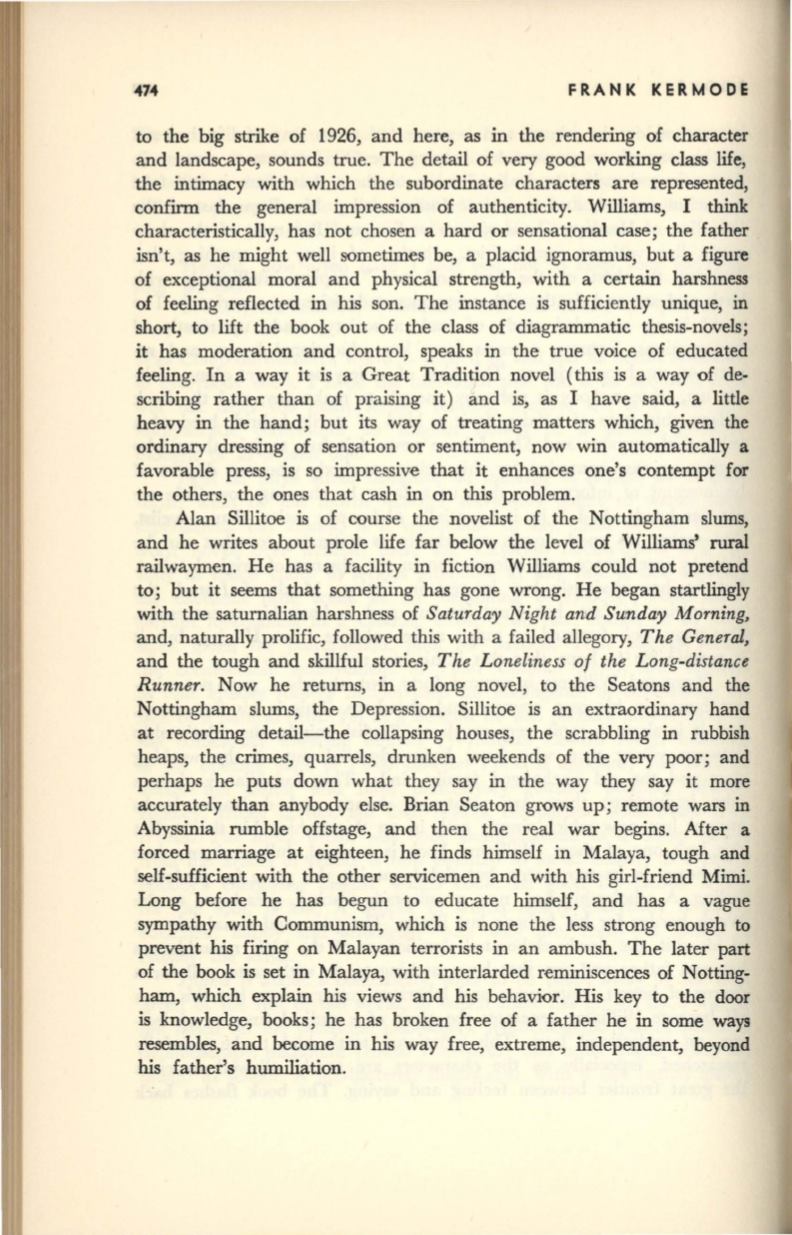
474
FRANK KERMODE
to the big strike of 1926, and here, as
in
the rendering of character
and landscape, sounds true. The detail of very good working class life,
the intimacy with which the subordinate characters are represented,
confirm the general impression of authenticity. Williams, I
think
characteristically, has not chosen a hard or sensational case; the father
isn't, as he might well sometimes be, a placid ignoramus, but a figure
of exceptional moral and physical strength, with a certain harshness
of feeling reflected in his son. The instance is sufficiently unique, in
short, to lift the book out of the class of diagrammatic thesis-novels;
it has moderation and control, speaks in the true voice of educated
feeling.
In
a way it is a Great Tradition novel (this is a way of de–
scribing rather than of praising it) and is, as I have said, a little
heavy
in
the hand; but its way of treating matters which, given the
ordinary dressing of sensation or sentiment, now win automatically a
favorable press, is so impressive that it enhances one's contempt for
the others, the ones that cash in on this problem.
Alan Sillitoe
is
of course the novelist of the Nottingham slums,
and he writes about prole life far below the level of Williams'
rural
railwaymen. He has a facility in fiction Williams could not pretend
to; but it seems that something has gone wrong. He began startlingly
with the saturnalian harshness of
Saturday Night and Sunday Morning,
and, naturally prolific, followed this with a failed allegory,
The General,
and the tough and skillful stories,
The Loneliness
.of
the Long-distance
Runner.
Now he returns, in a long novel, to the Seatons and the
Nottingham slums, the Depression. Sillitoe is an extraordinary hand
at recording detail-the collapsing houses, the scrabbling in rubbish
heaps, the crimes, quarrels, drunken weekends of the very poor; and
perhaps he puts down what they say in the way they say it more
accurately than anybody else. Brian Seaton grows up; remote wars in
Abyssinia rumble offstage, and then the real war begins. Mter a
forced marriage at eighteen, he finds himself in Malaya, tough and
self-sufficient with the other servicemen and with his girl-friend Mimi.
Long before he has begun to educate himself, and has a vague
sympathy with Communism, which is none the less strong enough to
prevent his firing on Malayan terrorists in an ambush. The later part
of the book is set in Malaya, with interlarded reminiscences of Notting–
ham, which explain his views and his behavior. His key to the door
is knowledge, books; he has broken free of a father he in some ways
resembles, and become in his way free, extreme, independent, beyond
his father's humiliation.


